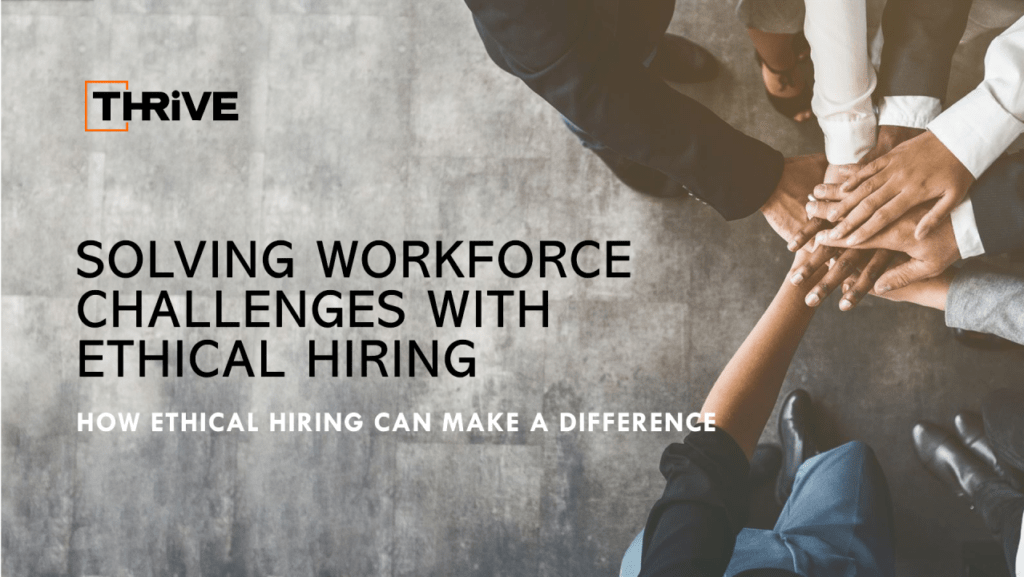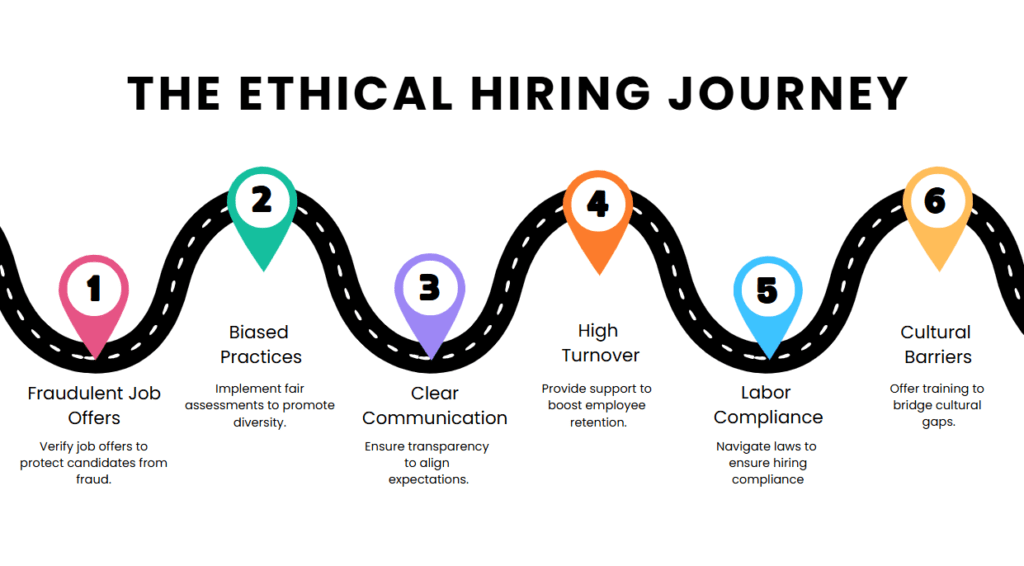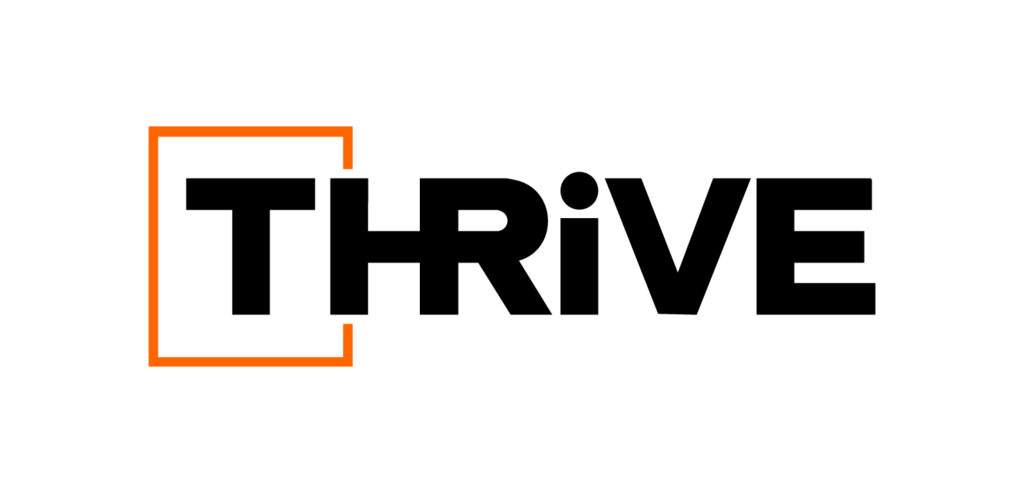
From weeding out fraudulent offers to ensuring transparency and overcoming unconscious biases, finding and retaining the right talent has become increasingly challenging. The harsh reality is if these complications are not addressed, can lead to high turnover, reputational damage, and poor long-term outcomes for businesses. Ethical hiring is no longer an option but a necessity for organizations seeking sustainable growth and success.
But what exactly are the challenges in the recruitment of the workforce today, and how can ethical hiring practices provide solutions? Let’s take a closer look.
The Challenges and Solutions of Ethical Recruitment
1. Fraudulent Job Offers
Challenge: In regions with high demand for semi-skilled labor, job scams have become alarmingly prevalent. Exploitative agencies deceive candidates with promises of non-existent jobs or demand hefty fees in exchange for securing employment.
What are the impacts?
These scams not only harm job seekers but also affect employers’ reputations, especially when they are unknowingly associated with fraudulent agencies.
Solution: The right way to combat this issue is with a rigorous verification process. Meticulously vet both employers and candidates to ensure the legitimacy of every job offer. This thorough due diligence prevents job seekers from falling victim to scams and shields businesses from reputational harm. By maintaining transparency throughout the recruitment process, you can build trust with all parties involved, ensuring a secure and ethical hiring environment.
2. Biased Recruitment Practices
Challenge: The most faced challenge is that of a biasness. Bias, whether intentional or unconscious, continues to plague recruitment practices. Discrimination based on factors such as age, race, or gender can limit diversity and result in missed opportunities. This can manifest in everything from exclusionary job descriptions to interview processes that unfairly favour certain demographics.
Solution: It’s important to promote diverse and inclusive recruitment by applying objective, standardized evaluation criteria. Ensure that all candidates are assessed fairly based on their skills and qualifications, rather than subjective factors. This approach enables businesses to tap into a broader talent pool, fostering diversity and innovation within their workforce.
3. Lack of Communication
Challenge: A lack of clear communication during the hiring process can lead to misunderstandings and misaligned expectations. Candidates may accept roles based on incomplete information about job responsibilities or compensation, while employers may end up with candidates who are not a good fit. This lack of transparency contributes to dissatisfaction and high attrition rates.
Solution: Transparent communication is the cornerstone of ethical hiring. Ensure that candidates are fully informed about their roles, compensation, and company culture before they accept a job. Likewise, employers should be provided with clear and accurate candidate profiles. By aligning expectations on both sides, it facilitates smoother transitions, better hires, and long-term employee retention.
4. High Turnover and Low Retention
Challenge: Industries with semi-skilled labor often experience high turnover rates, particularly when workers feel disengaged or undervalued. This constant churn of employees increases recruitment costs and reduces productivity, creating a cycle that’s difficult to break.
Solution: Someone must break the cycle, be the one!
As a hiring company, you must provide ongoing support to both employers and employees. Offer training and development programs for candidates, helping them thrive in their roles and stay engaged. Additionally, work with businesses to foster a supportive work environment, ensuring employees feel valued and invested in their jobs. This approach not only reduces turnover but also boosts overall productivity and job satisfaction.
5. Non-Compliance with Labor Laws
Challenge: No second thoughts, the complex landscape of labor laws, particularly when hiring semi-skilled workers across borders, presents significant challenges for businesses. Failing to comply with regulations can lead to fines, legal issues, and damage to a company’s reputation.
Solution: Ensure full compliance with labor laws through a comprehensive understanding of both local and international regulations. Guide employers through the legal complexities of hiring, including visa and immigration requirements. This not only protects businesses from legal issues but also ensures a smooth and compliant hiring process.
6. Cultural and Language Barriers
Challenge: When you’re working with a globalized workforce, navigating cultural differences and language barriers can really become a challenge, especially in industries like hospitality or healthcare, where communication is everything. It’s easy for misunderstandings to happen, and when misunderstandings happen, it can lead to lower efficiency and even dampen team morale, making it harder for everyone to work smoothly together.
Solution: Facilitate cross-cultural integration by offering language and cultural sensitivity training for workers. Prepare employees to integrate seamlessly into diverse work environments, ensuring they can communicate effectively and collaborate with their colleagues. This results in a more cohesive, productive, and harmonious workforce.

Now who to choose and why?
Let’s be honest – Ethical hiring practices aren’t just a nice-to-have, they’re essential for your business’s long-term success. When you partner with Thrive, you’re not just getting candidates; you’re getting a recruitment process that’s rooted in transparency, integrity, and fairness. We make sure every candidate is thoroughly vetted, every job offer is legit, and every placement works in favor of both the employee and you, the employer.
Partner with Thrive today—where ethical hiring meets exceptional workforce solutions.


















